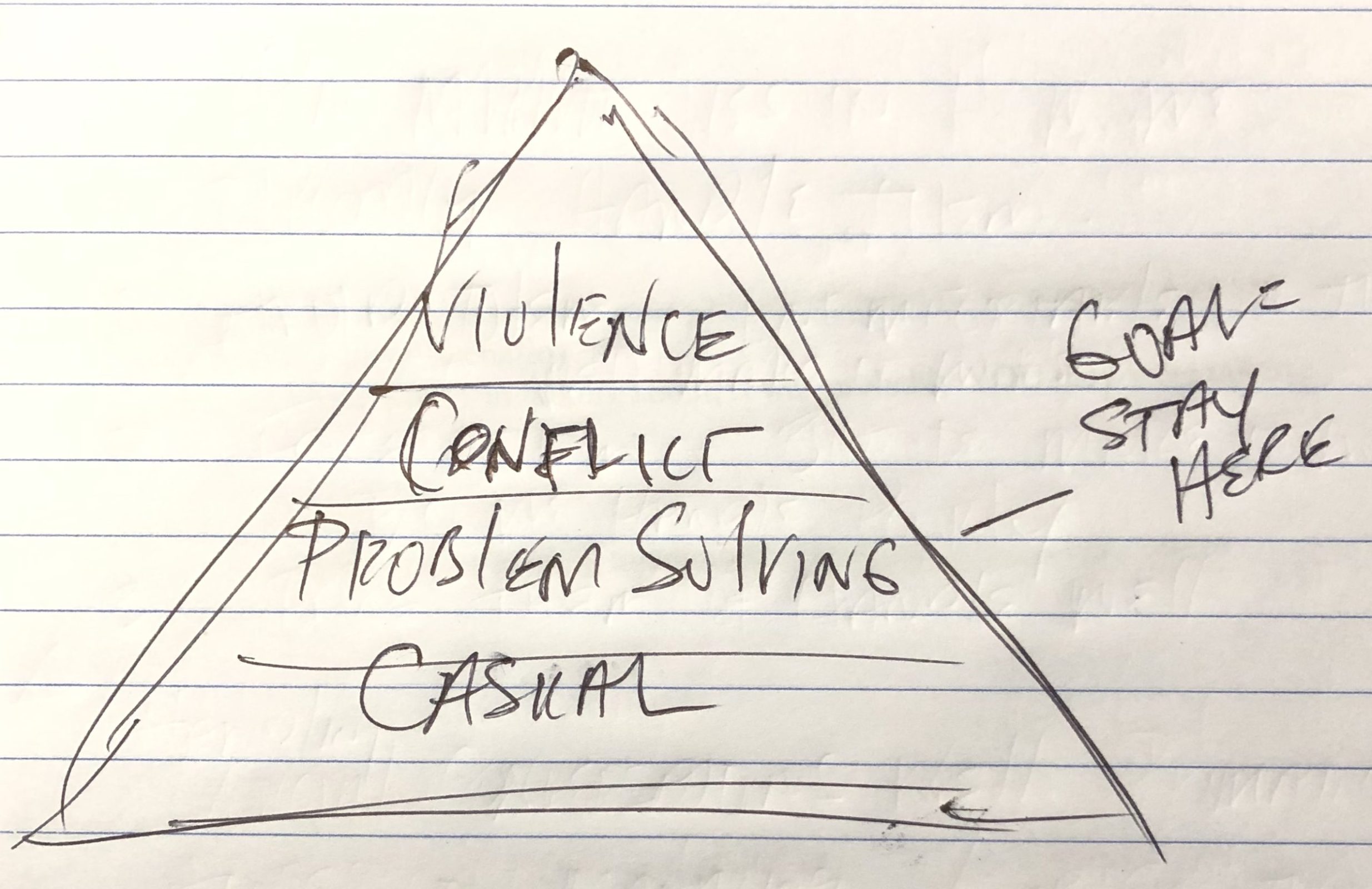“What’s your problem?!?” I know you’ve been asked that. Maybe you’ve uttered those words yourself, right before realizing things were about to go south. It’s a legitimate question, but one that’s usually asked in the wrong tone at the wrong time.
I have been asking myself that question for weeks now. While I usually ask it when struggling with my thought life or downswings in my mood or attitude, recently it’s been related to my lack of motivation to write an article. The solution came after talking to my friend. He experienced similar ‘writers block’ as he contemplated the much more significant purpose of drafting his brother’s (and our bandmate’s) eulogy. He tells me he awoke in the middle of the night and just started writing.
History repeated itself in a sense, for as chatting with him was part of my solution here, he likewise helped me move from problem to solution a few years ago when he convinced me to join his band to help me recover from a dark time in my life.
Problem: They needed a drummer (I didn’t play drums).
Solution: Now I do.
It would be easy to swing at the softball floating toward home plate courtesy of the pandemic right now. After all, the current medical-social-political-economic finger-pointing circus supplies ample example; there is no shortage of those who are part of the problem. The good news is, there are just as many who are working hard to be part of the solution.
Besides people who barely passed high school math suddenly knowing more about infectious disease than actual scientists and doctors, people who are part of the problem do things like this: litter; don’t scoop their dog’s poop; procrastinate excessively; blame others; engage in cronyism and favoritism; fail to learn from mistakes; are inconsiderate or entitled (typically related); leave their shopping cart parked where cars are supposed to; pretend to care about people.


They may also fail to recognize (or care) they are part of the problem.
Here are a few ideas to be more of a solution:
- Make room for God in your life. When we rightly understand our own unworthiness compared to the righteousness of a Holy God, we tend to be less of a problem for others.
- Stop claiming the misfortunes of others as your own in some attempt to justify living however you want, or as an excuse for your own bad behavior (cf. peaceful protesting vs. arson, looting, assault, and property destruction). If you want to be a voice and strength for the oppressed or weak, live honorably in such a way that brings about positive change. “Let your light shine before others…” (Matt. 5.16)
- As Dr. Samuel Betances used to say, stop counting heads and start making heads count. Embrace diversity. Enable diversity to foster and thrive by treating everyone with dignity and respect. We are all humans created in the image of God. I don’t believe supporting one race, gender, orientation, or ethnicity has to be to the exclusion, debasement, or detestation of another; you don’t have to be ‘one of’ to ‘stand with’. Fostering a culture of diversity involves being part of the solution.
- Take ownership of your mistakes and shortcomings. Learn from them. Everyone stumbles and falls short. Owning your mistakes is solution-oriented; blaming others makes you part of the problem.
- Pick up after yourself; leave things better than you found them; say please, thank you, and I love you more often; be a good (nobody’s perfect) human being.
- If you see someone struggling or in need – mentally, emotionally, physically, spiritually – help them. Saying to yourself, “It’s not my problem” is part of the problem.
Bystander intervention, being kind, considerate, polite, old-fashioned, or a Good Samaritan. Whatever you call it, consider this: “Suppose a brother or a sister is without clothes and daily food. If one of you says to them, ‘Go in peace; keep warm and well fed,’ but does nothing about their physical needs, what good is it?” That’s from the second chapter of James, where he relates that faith, when not accompanied by works, is dead. Even the secular rock band A Perfect Circle seems to get it. Consider these excerpted lyrics from ‘Talk Talk’:
You’re waiting…On miracles…We’re bleeding out
While you deliberate…Bodies accumulate Sit and talk like Jesus…Try walkin’ like Jesus
Don’t be the problem, be the solution
Faith without works is, Talk without works is
Faith without works is Dead, dead, dead, dead
Try braving the rain, Try lifting the stone, Try extending a hand
Try walkin’ your talk or get the f**k out of my way
The Christian band Casting Crowns likewise addresses not walking the talk in their song ‘If We are the Body’:
But if we are the body, why aren’t his arms reaching? Why aren’t his hands healing? Why aren’t his words teaching? And if we are the body, why aren’t his feet going? Why is his love not showing them there is a way?
There is so much more I need to say about this subject, but I’ve already overstayed my welcome.
If you are a so-called leader who plays favorites, cares only about what benefits you, or creates problems where (or because) none exist, you’re part of the problem. Leadership involves solving problems, not creating them.
Be part of the solution.
Get Strong. Be Strong. Stay Strong.
Lyrics retrieved from https://www.lyricfind.com

